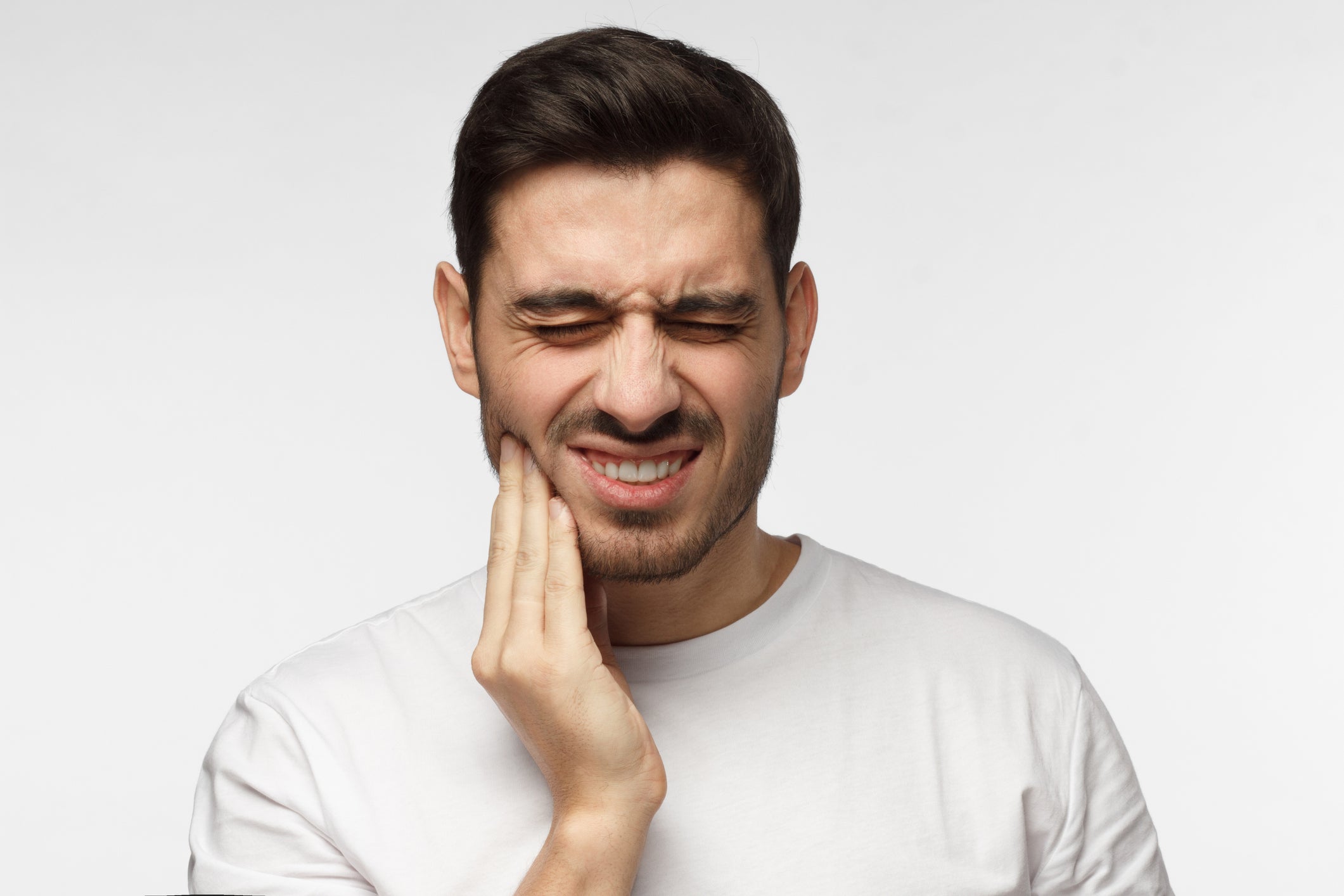-
Preventing Dental Emergencies: Tips and Tricks to Keep Your Teeth Safe

Man taking care of teeth to prevent dental emergencies.
Dental Emergencies Are a Problem
When you have a dental emergency, it’s more than just inconvenient, it’s also traumatic. Painful and stressful, accidents can lead to hours at the emergency dentist and, in some cases, permanent tooth loss or severe gum bleeding. While there’s no way to prevent accidents completely, there are a few steps you can take to avoid most dental emergencies.
Your Dentist is Your Ally
Regular dental visits can help keep your teeth healthy and strong, catching problems before they become emergencies. What’s more, your dentist can recommend measures like sealants to protect your teeth from decay or an oral appliance to guard against bruxism. See your dentist twice a year for preventive care and a cleaning. Being proactive about preventive dental care can be much less costly and stressful in the long run.
Tips for Keeping Your Teeth Safe
- Practice good dental hygiene. At home, brush twice a day, floss at least once, and use mouthwash. Keeping your teeth clean can help prevent cavities, gum disease, cracks, fractures, and infections. Having your teeth deep cleaned at the dentist’s office twice a year gives added protection.
- Eat a tooth-strengthening diet. Eat a nutrient-dense diet, taking care to eat foods like leafy greens, fresh fruits and vegetables, and calcium-rich foods. Limit consumption of processed foods and sugary sweets, which can cause plaque buildup and feed the bacteria that cause tooth decay.
- Protect your teeth during sports. If you participate in sports, talk to your dentist about getting a custom-made mouthguard. This can make a big difference in keeping your teeth from being knocked out or damaged. You might also want a mouthguard to wear at night, to prevent teeth grinding.
- Manage your stress. Stress is bad for your whole body, and it can damage your teeth. People who are stressed may absentmindedly chew on hard things, and stress can cause people to grind their teeth. Embrace techniques like mindfulness, practice yoga, or find other healthy ways to manage your stress.
- Remember that teeth are not tools. We’ve all used our teeth for something we shouldn’t from time to time, when we can’t find the scissors, or the bottle opener is in another room. It could be fine, but then on the other hand, it only takes once for a tooth to crack. The convenience of not having to rummage through a drawer or ask for help is not worth risking your teeth.
- Don’t hesitate to seek dental care. Don’t let a dental emergency get out of hand. If you have a toothache, seek treatment as quickly as possible. Pain is an indication that something is not right, and getting treatment quickly can mean the difference between a routine procedure and serious oral surgery.
Park 56 is Here for Your Emergencies
If you’re looking for a dentist in New York, why not choose the dentist voted best in the city? At Park 56 Dental Group, we offer pediatric, prosthodontics, endodontics, oral surgery, Invisalign®, emergency, and sedation dentistry, all at the highest level of treatment. We serve the Midtown, Central Park, Upper East Side, Park Avenue, and all surrounding Manhattan and New York areas, with a patient-centered practice that has hours to fit your schedule. Schedule your complimentary consultation today by contacting us online or calling us at (212) 826-2322.
-
Emergency Dental Care

Woman Suffering From Dental Emergency
It’s natural to feel alarmed when you experience a toothache or get hit in the mouth. Is the pain a minor annoyance, or are you about to face a dental emergency? Understanding the difference between urgent and non-urgent dental scenarios helps you act quickly when necessary to maintain your radiant smile.
Deciding If it’s a Dental Emergency
Dental emergencies come in many forms. Some issues require immediate attention to alleviate pain and improve the chances of saving a damaged tooth. Watch for these symptoms of a dental emergency:
- Intense toothache
- Excessive bleeding
- Trauma to the face
- Loose or knocked-out tooth
- Broken or chipped tooth with a large chunk missing
Other issues aren’t a major cause for concern and can wait for a regular appointment. Examples of non-urgent situations include:
- Lost filling or crown
- Cracked tooth without pain or sharp fragments
- Mild toothache with no other symptoms
The Crucial First Response
If you determine you’re having a dental emergency, knowing how to respond is crucial. Follow these tips until you can get to an emergency dentist:
- Treating a toothache: Rinse your mouth with warm water and gently floss to remove trapped food. If the pain persists, take over-the-counter pain relievers. Then, book a dentist appointment to find out what’s wrong.
- Treating excessive bleeding: Rinse with a saltwater solution. Then, apply a clean, damp piece of gauze or a cool, used tea bag to the area. If bleeding continues after 15 to 20 minutes, seek medical help.
- Treating a loose tooth: A loose tooth in adults is not normal. Avoid wiggling it to prevent further damage, and contact your dentist for a professional evaluation.
- Treating a knocked-out tooth: Handle the tooth carefully. Avoid touching the root, rinse it with water if dirty, and try reinserting it into its socket. If that’s not possible, store the tooth in a container of milk or use a tooth preservation kit and go to the dentist immediately.
- Treating a broken, cracked, or chipped tooth: Rinse your mouth with warm water and apply a cold compress. Over-the-counter pain relievers minimize discomfort. Contact your dentist right away, even if there’s no pain, because the tooth may be damaged internally.
The Role of an Emergency Dentist
An emergency dentist handles urgent cases with the proper tools and training. From antibiotics for infections to quick dental procedures for saving a knocked-out tooth, these professionals provide immediate relief and ensure long-term oral health.
Park 56 Dental is your go-to provider for same-day emergency dental care. We have served patients in the 10022 zip code and surrounding areas since 1997. We even boast the title of NYC’s best dentist. Our office feels more like a spa, and we focus on giving personalized, quality dental care to each patient. Our team has experience with everything from general dentistry and sedation dentistry to oral surgery and endodontics.
The next time a dental emergency strikes, you can count on us! Call Park 56 Dental at (212) 826-2322, and we’ll help you get your oral health back on track.
-
Dental Emergency: What to Do When a Tooth Gets Knocked Out

Did you know that more than five million teeth are knocked out every year in children and adults? If this happens to one of your loved ones, don’t worry! Quick action can improve your odds of saving the tooth.
Causes of Knocked Out Teeth
Teeth get knocked out for various reasons that all involve an impact to the face. Most often, a tooth becomes knocked out during a contact sport when the participant failed to wear a mouthguard. The most common ways that teeth get knocked out include:
- Sports injuries
- Car accidents
- A fight
- Tripping or falling
Sports-related oral trauma ranges from a chipped tooth to having a tooth completely knocked out. By taking quick action, caretakers can make a big difference on salvaging the damage.
Preserving a Knocked-Out Tooth
Many are unaware that a tooth can be saved even if it is knocked out. Learn what to do immediately after a tooth is knocked out so you can restore your prior smile’s beauty. The following steps are recommended by the American Association of Endodontists to save a tooth that has been knocked out:
- Delicately pick up the lost tooth by the crown (also known as the chewing surface.)
- Use water to rinse the tooth. Only water, nothing else.
- Gently replace the tooth in the original socket at once. Keep it in place with your fingers or by biting down softly.
- Keep the tooth moist in your mouth. If it won’t stay in the socket, place in next to your cheek in your mouth, or in a small container of milk.
- Visit your dentist, endodontist, or emergency department within 30 minutes of the accident. (Some teeth can still be saved if it has been outside the mouth for more than hour but contact your dental provider for specific instructions.)
In the dentist’s office or emergency department, the tooth will either be re-implanted or splinted to the nearby teeth for a period of two-eight weeks. A root canal procedure will be needed for long-term survival of the tooth.
Other Reasons a Tooth May Fall Out
If you lose a tooth due to periodontal disease, the steps listed above will not save the tooth. Prevent this type of tooth loss by proactively visiting your dentist every six months and performing the proper oral care steps at home.
Park 56 Dental offers same-day emergency appointments to get you the critical care you need when a tooth is knocked out. We understand that dental injuries require immediate, personalized care to put your mind at ease and to restore your smile.
Contact us today at (646) 679-3989 if you have any questions about a dental emergency or what to do. Your safety and well-being are our first priority!
RECENT POSTS
categories
- Uncategorized
- Cosmetic Dentistry
- Veneers
- Healthier Teeth
- Teeth Whitening
- Dental Health
- Video
- Dental Emergencies
- Invisalign
- Dental Implants
- Root Canal
- Sedation Dentistry
- Infographic
- Dental Crowns and Bridges
- Dental Anxiety
- Gum Disease
- COVID-19
- Bad Breath
- New York Dentist
- Cut out sugar
- General Dentistry
- Oral Health
- Oral Cancer
- Dry Mouth
- Gum Health
- Toothache
- Dental Sealants
- Cavities
